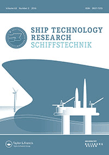
Ship Technology Research
Scope & Guideline
Innovating maritime practices for a sustainable future.
Introduction
Aims and Scopes
- Naval Architecture and Ship Design:
The journal emphasizes research on the design and optimization of ship structures, focusing on advanced modeling techniques, computational fluid dynamics (CFD), and innovative design methodologies. - Hydrodynamic Performance Analysis:
A core area of research involves the exploration of hydrodynamic interactions, including seakeeping, resistance, and propulsion performance under various operational conditions. - Marine Technology and Automation:
The integration of digital technologies, such as AI and machine learning, into marine applications is a significant focus, particularly in monitoring and optimizing ship performance. - Environmental Impact and Energy Efficiency:
Research aimed at improving the energy efficiency of ships and reducing their environmental footprint through innovative technologies and operational strategies is a priority. - Autonomous and Smart Shipping:
The journal explores the implications of autonomous shipping technologies, including design considerations and regulatory frameworks for inland and maritime operations.
Trending and Emerging
- Artificial Intelligence and Machine Learning:
There is a significant increase in studies applying AI and machine learning techniques to various ship design and operational challenges, indicating a trend towards smarter, data-driven decision-making in the maritime sector. - Digital Twin Technologies:
The application of digital twins for real-time monitoring and optimization of ship performance is gaining traction, showcasing the industry's move towards enhanced operational efficiency and predictive maintenance. - Sustainability and Eco-friendly Technologies:
Research focused on developing sustainable technologies, such as energy-efficient propulsion systems and eco-friendly materials, is increasingly prevalent, reflecting global efforts to reduce the carbon footprint of maritime operations. - Advanced Computational Methods:
The use of advanced computational methods, including CFD and numerical simulations, is on the rise, particularly in studies addressing complex fluid-structure interactions and hydrodynamic performance. - Autonomous Shipping Technologies:
A growing body of research is dedicated to the design and implementation of autonomous shipping solutions, highlighting the industry's shift towards automation and its implications for safety and efficiency.
Declining or Waning
- Traditional Shipbuilding Methods:
Research focused on conventional shipbuilding techniques has decreased, likely due to the industry's shift towards advanced manufacturing technologies, such as additive manufacturing and digital twins. - Static Performance Metrics:
There is a noticeable decline in studies solely focused on static performance metrics of ships, as the field increasingly values dynamic and real-time performance assessments through data-driven methods. - Historical Ship Design Practices:
The exploration of historical practices in naval architecture is becoming less common, as contemporary research prioritizes innovative and modern approaches to ship design and technology. - Basic Hydrodynamic Studies:
Basic studies on hydrodynamic principles without application to modern technologies are less frequently published, reflecting a trend towards more complex and application-oriented hydrodynamic research. - Single-Domain Research Focus:
Research that does not integrate multiple domains, such as environmental impact, operational efficiency, and technological innovation, is seeing reduced prominence, with a growing preference for interdisciplinary approaches.
Similar Journals

Scientific Journals of the Maritime University of Szczecin-Zeszyty Naukowe Akademii Morskiej w Szczecinie
Fostering collaboration in the maritime academic community.Scientific Journals of the Maritime University of Szczecin (Zeszyty Naukowe Akademii Morskiej w Szczecinie) is a premier academic journal published by the Maritime University of Szczecin, dedicated to advancing knowledge in the maritime sciences and related disciplines. With an ISSN of 1733-8670 and an E-ISSN of 2392-0378, the journal has been a vital resource for researchers, professionals, and students since its transition to Open Access in 2008, ensuring that valuable research is readily accessible to a global audience. The journal aims to disseminate high-quality original research, reviews, and case studies related to maritime engineering, marine technology, nautical science, and environmental studies, thereby fostering innovation and collaboration within the field. Situated in Szczecin, Poland, the journal plays a significant role in enhancing the maritime academic landscape and contributing to sustainable development within the maritime industry.

NAVAL ENGINEERS JOURNAL
Bridging theory and practice in naval architecture.NAVAL ENGINEERS JOURNAL, published by the American Society of Naval Engineers, serves as a pivotal platform for the dissemination of research and advancements in naval engineering. With a rich publication history dating back to 1889, this journal offers vital insights into the principles, practices, and technologies that shape the naval engineering discipline. While it does not operate under an open access model, NAVAL ENGINEERS JOURNAL remains an essential resource for researchers, professionals, and students, facilitating a deeper understanding of marine engineering challenges and innovations. It encompasses a range of topics including, but not limited to, ship design, propulsion systems, and naval architecture, making it a critical resource for practitioners and scholars committed to advancing maritime technologies. For those interested in the most recent studies and discussions in the field, this journal serves as an authoritative reference, fostering collaboration and knowledge sharing among the naval engineering community.
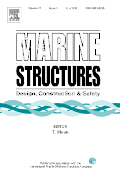
MARINE STRUCTURES
Pioneering Research in Marine StructuresMARINE STRUCTURES, published by Elsevier Science Ltd, is a premier scholarly journal that has established itself as an essential platform for the dissemination of cutting-edge research in the fields of Marine Engineering, Ocean Engineering, and Materials Science. With an impressive H-index reflecting its substantial citation impact, and boasting a Q1 ranking across several categories including Materials Science and Mechanical Engineering as of 2023, this journal is recognized globally for its contributions to advancing knowledge and innovation in marine structures. The journal covers a wide range of topics, from the design and analysis of marine structures to the latest technologies and methodologies in ocean engineering, making it invaluable for researchers, professionals, and students alike. As the journal continues to publish high-quality articles that explore contemporary challenges and opportunities within the marine domain, it serves as a catalyst for collaboration and knowledge exchange among academia and industry. Researchers are encouraged to submit their original works and benefit from the rigorous peer-review process that ensures the quality and reliability of published content. MARINE STRUCTURES is not currently an open access journal, providing a subscription-based model that facilitates access to its authoritative body of knowledge.
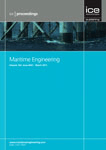
PROCEEDINGS OF THE INSTITUTION OF CIVIL ENGINEERS-MARITIME ENGINEERING
Pioneering Research in Ocean Engineering.PROCEEDINGS OF THE INSTITUTION OF CIVIL ENGINEERS-MARITIME ENGINEERING, published by Emerald Group Publishing Ltd, is a leading journal in the field of Maritime Engineering. With a reputable ISSN of 1741-7597 and an E-ISSN of 1751-7737, this journal has established itself as a cornerstone for researchers, professionals, and students keen to explore the complexities of ocean engineering. Operating primarily from the United Kingdom, it has made significant contributions to the advancement of the maritime industry since its inception, covering research from 2001 to 2024. The journal currently holds a Q3 ranking in Ocean Engineering as classified by Scopus, where it ranks 21st among 105 journals in the category, placing it in the 80th percentile, which highlights its influence and relevance in contemporary marine research. Through a rigorously peer-reviewed process, the journal publishes innovative and high-quality articles that encompass broad aspects of maritime engineering, including design, construction, and sustainability, thus serving as a vital resource for those engaged in this dynamic field. By fostering dialogue among professionals and providing access to cutting-edge research, the PROCEEDINGS OF THE INSTITUTION OF CIVIL ENGINEERS-MARITIME ENGINEERING continues to shape the future of maritime engineering practice and education.
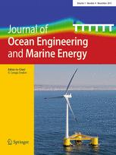
Journal of Ocean Engineering and Marine Energy
Pioneering Interdisciplinary Approaches in Ocean EnergyJournal of Ocean Engineering and Marine Energy, published by SpringerNature, stands at the forefront of interdisciplinary research within the fields of ocean engineering and marine energy. Since its inception in 2015, this journal has aimed to address critical challenges and innovations in energy systems, particularly those harnessed from marine environments, thereby contributing to sustainable development and efficient resource management. With an esteemed Q2 ranking in multiple categories such as Energy Engineering and Power Technology, and Ocean Engineering, the journal serves as a vital platform for researchers, professionals, and students seeking to disseminate and engage with cutting-edge research and technological advancements. Boasting a robust readership and a commitment to open-access principles, the journal fosters a collaborative environment for the exploration of new ideas and approaches in a rapidly evolving sector. By bridging the gap between academia and industry, Journal of Ocean Engineering and Marine Energy remains instrumental in shaping the future of renewable energy solutions and environmental sustainability.
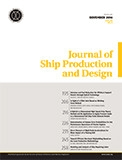
Journal of Ship Production and Design
Navigating the future of ship production and design.Journal of Ship Production and Design is an esteemed publication dedicated to advancing the fields of shipbuilding and marine engineering. Published by the SOC Naval Architects & Marine Engineers in the United States, this journal serves as a vital platform for sharing innovative research and developments in mechanical and ocean engineering. With an ISSN of 2158-2866 and an E-ISSN of 2158-2874, the journal covers a wide spectrum of topics relevant to ship production, design methodologies, and advancements in materials and technologies used in marine applications. Although it currently operates without open access, the journal has established itself in the academic community, reflected by its rankings in Scopus and various quartiles in 2023, demonstrating its relevance and contribution to engineering disciplines. Since its inception in 2013, the Journal of Ship Production and Design has played a crucial role in disseminating knowledge, fostering collaboration, and inspiring the next generation of engineers and researchers in increasingly competitive fields.

Journal of Naval Architecture and Marine Engineering
Exploring New Horizons in Ocean EngineeringJournal of Naval Architecture and Marine Engineering is a distinguished open-access journal dedicated to advancing the field of marine engineering and naval architecture. Published by the ASSOCIATION OF NAVAL ARCHITECTS & MARINE ENGINEERING in Bangladesh, this journal has been a crucial platform for the dissemination of innovative research and practical applications since its transition to open access in 2007. With an impressive Q2 ranking in Ocean Engineering and a well-respected position within the Scopus rankings, it serves a vital role in connecting researchers and industry professionals. Covering a wide scope of topics from hydrodynamics to ship design and marine environmental protection, the journal invites contributions that enhance the knowledge and technology within the maritime sector. Accessed by a global audience, it is an essential resource for those seeking to make significant advancements in naval engineering.
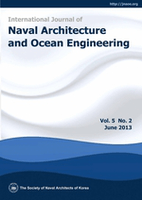
International Journal of Naval Architecture and Ocean Engineering
Pioneering sustainable solutions for the maritime industry.International Journal of Naval Architecture and Ocean Engineering is a premier academic journal dedicated to advancing the fields of naval architecture and ocean engineering. Published by the SOC NAVAL ARCHITECTS KOREA, this Open Access journal has been a vital resource for researchers and industry professionals since its founding in 2009, providing unrestricted access to high-quality, peer-reviewed articles. With a notable Q2 ranking in both Control and Systems Engineering and Ocean Engineering, it ranks among the top journals in its category, offering valuable insights into emerging technologies and methodologies. The journal’s reputation is further highlighted by its Scopus rankings, positioning it within the top 30% of journals in Ocean Engineering and the top 31% in Control and Systems Engineering as of 2023. Based in the vibrant academic hub of Seoul, South Korea, the journal invites manuscripts that explore innovative solutions and critical research to address the challenges in naval and oceanic environments, contributing to the global dialogue on sustainable maritime practices.
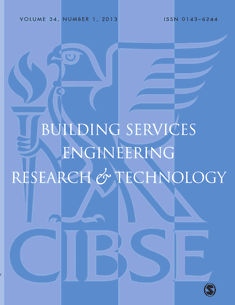
Building Services Engineering Research & Technology
Elevating Standards in Building Services EngineeringBuilding Services Engineering Research & Technology is a leading journal published by SAGE Publications Ltd, dedicated to advancing the field of building services engineering. With an ISSN of 0143-6244 and an E-ISSN of 1477-0849, the journal has established itself as a vital resource since its inception in 1980, operating as an essential platform for disseminating high-quality research and technological innovations up to 2024. The journal is well-respected within the academic community, reflected in its Q2 category ranking in Building and Construction and a commendable 67th percentile rank among the 223 journals in its field, according to Scopus. Although it does not offer open access, it provides extensive insights and rigorous studies that are invaluable for researchers, practitioners, and students alike. As a central hub for the exploration of cutting-edge methods and principles in building services, the journal aims to foster a better understanding of sustainable and innovative practices within the industry.

International Shipbuilding Progress
Pioneering insights into the evolving world of shipbuilding.International Shipbuilding Progress is a distinguished journal dedicated to advancing knowledge in the fields of Mechanical and Ocean Engineering, published by IOS PRESS. With a rich history dating back to 1969 and over four decades of scholarly contributions, this journal serves as a vital platform for researchers, professionals, and students seeking to explore innovative technologies and advancements within the shipbuilding sector. Although it currently does not offer open access options, the journal is held in high regard, reflected by its Q3 ranking in both the Mechanical Engineering and Ocean Engineering categories according to the latest 2023 category quartiles. The journal aims to disseminate high-quality research findings and foster collaboration among experts globally, enhancing the maritime and shipbuilding industries. For those engaged in maritime innovation and engineering, International Shipbuilding Progress is an essential resource for staying abreast of the latest developments and research trends.